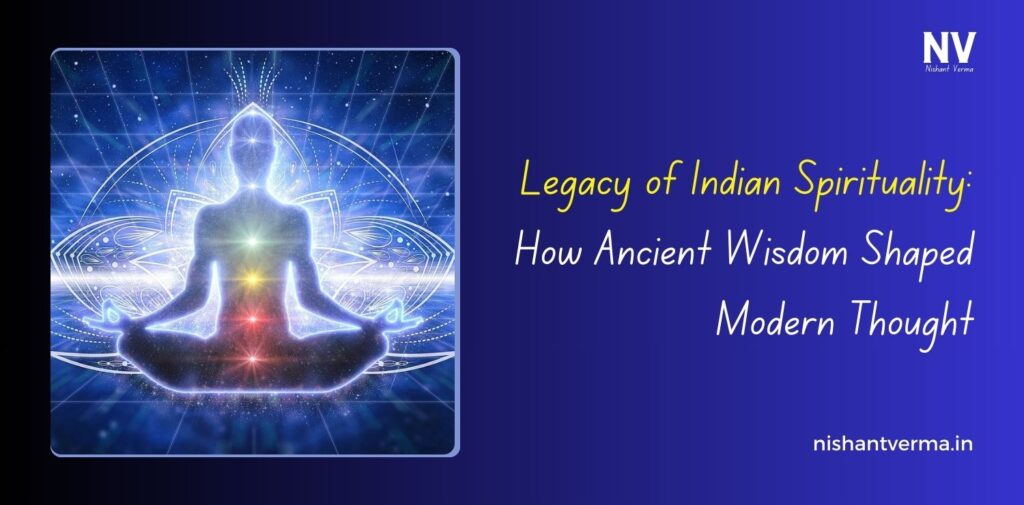Indian spirituality has a profound and timeless influence that continues to shape not only the culture of India but also global philosophy, politics, and spiritual practices. Ancient texts like the Bhagavad Gita and the Upanishads offer insights into the nature of existence, the self, and the universe that have been cherished for thousands of years. These texts are not just religious scriptures—they are profound sources of wisdom that continue to inspire and guide people today, helping them navigate the complexities of life and achieve greater inner peace.
In this article, we will explore how the ancient spiritual teachings of India continue to impact modern thought and contribute to global movements in philosophy, psychology, politics, and personal well-being.
Understanding the Bhagavad Gita and the Upanishads
Before we examine their influence, let’s take a brief look at the Bhagavad Gita and the Upanishads.
The Bhagavad Gita: A Guide to Life and Duty
The Bhagavad Gita (often referred to simply as the Gita) is a 700-verse scripture that is part of the Indian epic Mahabharata. The Gita presents a dialogue between Prince Arjuna and his charioteer, Lord Krishna. Arjuna faces a moral dilemma on the battlefield, torn between his duty as a warrior and his personal feelings of sorrow about fighting his family members. Lord Krishna offers him guidance on how to approach life, duty, and spirituality.
Central to the teachings of the Gita are concepts such as karma (the idea that our actions have consequences), dharma (righteous duty), and yoga (the path to spiritual union). These teachings emphasize the importance of selflessness, non-attachment to the results of one’s actions, and devotion to the greater good, all of which resonate with people from many different walks of life.
The Upanishads: Exploring the Nature of Reality
The Upanishads are a collection of ancient texts that form the philosophical backbone of Hinduism. They were written over several centuries, beginning around 800 BCE. These texts explore profound questions about the nature of reality, the self, and the universe. One of the key ideas in the Upanishads is the concept of Brahman, the ultimate, unchanging reality that underlies all existence, and Atman, the individual soul or self. The Upanishads teach that understanding the unity of Atman and Brahman is the path to liberation (moksha)—the release from the cycle of birth, death, and rebirth (samsara).
The Upanishads contain rich philosophical discussions about the relationship between the individual and the universe, the nature of the mind, and the path to enlightenment through meditation and self-realization.

How Indian Spirituality Influenced Modern Philosophy
Indian spiritual texts have had a lasting impact on global philosophy, both in the East and the West. Their teachings challenge traditional ways of thinking and have inspired numerous philosophers and thinkers over the centuries.
Influence on Western Philosophy
In the 19th and 20th centuries, Indian spiritual ideas began to have a significant influence on Western philosophy. The teachings of the Bhagavad Gita and the Upanishads found their way into the minds of many leading Western thinkers, sparking new philosophical movements and ideas.
One of the most notable figures who brought Indian philosophy to the West was Swami Vivekananda. His lectures on Vedanta, the philosophy rooted in the teachings of the Upanishads, inspired countless individuals in the United States and Europe. Vivekananda’s interpretation of Hindu philosophy emphasized the unity of all religions and the importance of self-realization, ideas that resonated with many Western intellectuals at the time.
In the United States, the transcendentalist movement, led by thinkers like Ralph Waldo Emerson and Henry David Thoreau, found much in common with the ideas found in the Upanishads. Thoreau, for example, was inspired by the teachings of the Upanishads on self-reliance and the pursuit of a higher truth. His famous work Walden reflects a deep connection to nature, mindfulness, and spiritual awareness—ideas that echo the teachings of the Indian sages.
The Bhagavad Gita also caught the attention of thinkers like Aldous Huxley, who wrote The Perennial Philosophy. In this book, Huxley argued that all major world religions share a common core of truth, focusing on the realization of an ultimate reality that transcends individual existence. The Gita’s emphasis on detachment from the material world and devotion to a higher spiritual path resonated deeply with Huxley’s exploration of universal spiritual principles.
Influence on Modern Psychology
Indian spirituality also made its mark on modern psychology, especially through the work of Carl Jung. Jung, the Swiss psychiatrist, found striking parallels between his theories of the unconscious and the ideas expressed in the Upanishads and the Bhagavad Gita. Jung’s concept of the collective unconscious—the idea that all human beings share a common psychological inheritance—bears similarities to the Brahman that pervades all of reality. Just as the Upanishads suggest that the individual soul is connected to the greater universal consciousness, Jung believed that humans have an innate connection to a deeper, collective spiritual reality.
Jung was also deeply interested in the therapeutic practices of meditation and introspection that are central to both the Upanishads and the Gita. He believed that self-awareness, achieved through contemplation and introspection, could lead to healing and personal transformation—an idea that has since become central to modern psychology, particularly in the areas of mindfulness and therapeutic meditation.

Indian Spirituality and Politics
While Indian spirituality’s influence on global politics may not be as widely discussed as its impact on philosophy or psychology, it has nonetheless shaped modern political thought and movements. The concepts of ahimsa (nonviolence) and seva (selfless service) that are central to the Bhagavad Gita and the Upanishads have inspired numerous leaders and social movements around the world, fostering values of peace, tolerance, and compassion.
In particular, the idea of living a life aligned with one’s dharma, or righteous duty, continues to resonate in the context of global social and political movements. The teachings in the Bhagavad Gita about acting selflessly, without attachment to the outcomes of one’s actions, have been influential in promoting ethical leadership and integrity in politics.
The Global Spread of Yoga and Meditation
Perhaps one of the most visible ways in which Indian spirituality has shaped the modern world is through the global spread of yoga and meditation. Both practices have their roots in the teachings of the Bhagavad Gita and the Upanishads, where yoga is described as a spiritual discipline that leads to union with the divine, and meditation is seen as a tool for self-realization and inner peace.
Yoga, once considered an ancient and esoteric practice, has become a global phenomenon. Millions of people around the world now practice yoga—not just for physical fitness, but as a means of mental and emotional healing, mindfulness, and spiritual growth. The Gita’s teachings on the importance of balance, discipline, and devotion resonate deeply with those seeking a more centred and holistic lifestyle.
Similarly, meditation, which is central to both the Upanishads and the Gita, has become a widely adopted practice in the West, particularly in the fields of mental health, stress reduction, and mindfulness. Meditation practices such as mindfulness meditation and transcendental meditation have grown in popularity, with people seeking mental clarity, emotional regulation, and a deeper connection to themselves and the world around them.

Conclusion: The Timeless Wisdom of Indian Spirituality
The spiritual wisdom found in the Bhagavad Gita and the Upanishads continues to offer profound insights into the nature of existence, the self, and our relationship with the universe. These ancient texts provide valuable guidance on how to live a meaningful and fulfilling life, emphasizing self-awareness, compassion, and the pursuit of inner peace.
The influence of Indian spirituality is not limited to India—it has shaped modern philosophy, psychology, politics, and global spiritual practices in profound ways. Whether through the teachings on nonviolence, the philosophical exploration of the self, or the widespread adoption of yoga and meditation, Indian spiritual traditions continue to inspire individuals and movements around the world.
In a world that can often feel disconnected and chaotic, the teachings of the Bhagavad Gita and the Upanishads offer a timeless reminder that true fulfilment comes from understanding the unity of all life and finding peace within ourselves. As more people around the globe turn to these ancient teachings for guidance, the legacy of Indian spirituality remains as relevant and powerful as ever.




